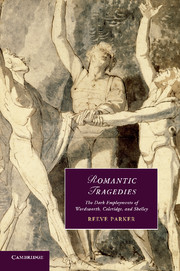Book contents
- Frontmatter
- Contents
- List of illustrations
- Acknowledgments
- Introduction: “Prowling out for dark employments”
- PART I WORDSWORTH
- PART II COLERIDGE AND SHELLEY
- CHAPTER 5 Osorio's dark employments: tricking out Coleridgean tragedy
- CHAPTER 6 Listening to Remorse: assuming man's infirmities
- CHAPTER 7 Reading Shelley's delicacy
- Notes
- Bibliography
- Index
- CAMBRIDGE STUDIES IN ROMANTICISM
CHAPTER 6 - Listening to Remorse: assuming man's infirmities
Published online by Cambridge University Press: 05 May 2014
- Frontmatter
- Contents
- List of illustrations
- Acknowledgments
- Introduction: “Prowling out for dark employments”
- PART I WORDSWORTH
- PART II COLERIDGE AND SHELLEY
- CHAPTER 5 Osorio's dark employments: tricking out Coleridgean tragedy
- CHAPTER 6 Listening to Remorse: assuming man's infirmities
- CHAPTER 7 Reading Shelley's delicacy
- Notes
- Bibliography
- Index
- CAMBRIDGE STUDIES IN ROMANTICISM
Summary
It is my intention, if I live long enough, to add to this work the passions Remorse, Jealousy, and Revenge. Joy, Grief, and Anger, as I have already said, are generally of too transient a nature, and are too frequently the attendants of all our other passions to be made the subjects of an entire play … Of all our passions, Remorse and Jealousy appear to me to be the best for representation.
Joanna Baillie, “To the Reader,” Series of Plays (1812)This chapter explores issues and problems posed by Coleridge's Remorse. Performed twenty times before the Public at Drury Lane in early 1813 and soon after in various provincial and American theaters, reviewed with some favor, and printed versions admired by Byron and Shelley, it's the only tragedy by a major writer of the period to achieve such public success. Yet, despite substantial and provocative critical reckonings in recent decades, it remains infrequently read and rarely if ever performed even in academic or coterie theaters, where productions of Shelley's The Cenci, and even of Byron's Sardanapalus and Wordsworth's Borderers have come to life. More important, crucial aspects of its dramaturgy remain largely unnoticed and unappreciated, dark poetic employments that relate not only to Coleridge's claims on our attention as a playwright at work with a theater company and as a theorist and critic of drama, but also to ongoing, intensified troubles in his life, particularly the agonizing upheavals in his relations with Sara Hutchinson and Wordsworth.
- Type
- Chapter
- Information
- Romantic TragediesThe Dark Employments of Wordsworth, Coleridge, and Shelley, pp. 141 - 179Publisher: Cambridge University PressPrint publication year: 2011



